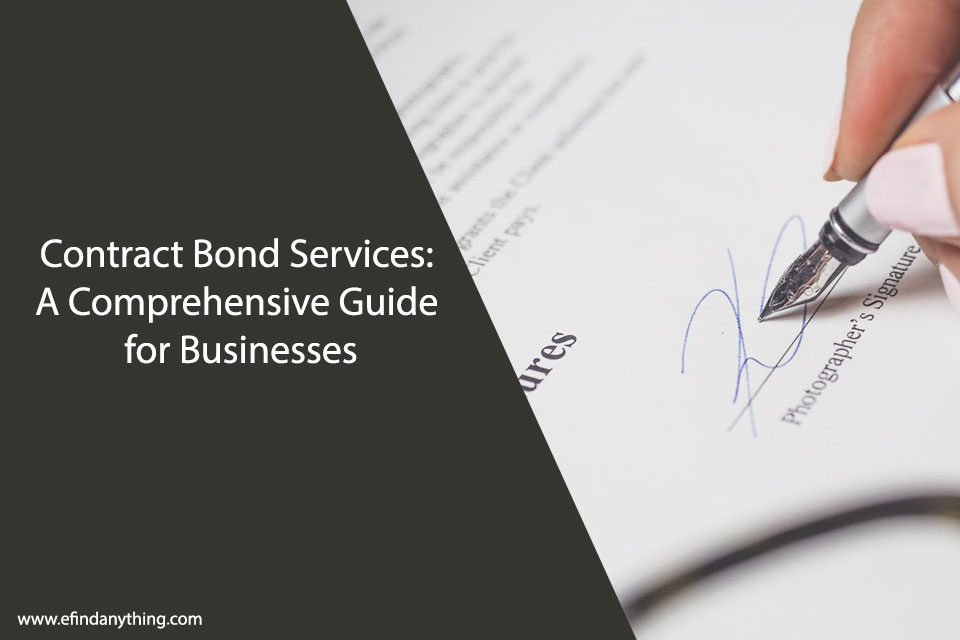
Bond requirements present obstacles when you try to secure construction or service contracts.
Although contract bond services are fundamental for operating in construction and service industries numerous businesses find it difficult to grasp their operation. The U.S. Small Business Administration confirmed they backed bid and final bonds worth over $7.3 billion in contract value during fiscal year 2023 according to SBA data.
This guide details all essential information about contract bond services including definitions, different types available and qualification criteria.
Table of Contents
What You’ll Discover:
- Understanding Contract Bonds: The Basics
- The Major Types of Contract Bonds
- How to Qualify for Contract Bonds
- Choosing the Right Surety Provider
- Learn about common pitfalls to avoid when assessing contract bond costs.
Understanding Contract Bonds: The Basics
A contract bond functions as a surety bond which ensures compliance with contractual obligations. A contract bond represents a tripartite arrangement which includes the Principal, the Obligee and the Surety.
- The Principal (you, the contractor)
- The Obligee refers to the project owner who needs the bond for their project.
- The Surety (the company providing the guarantee)
Contract bonds function as safeguards against non-performance while insurance coverage extends protection to unexpected events. A fundamental difference which numerous contractors overlook upon their initial experience with bond requirements.
Here’s why contract bonds matter:
- They provide financial security to project owners
- They establish your credibility as a contractor
- Public projects always require them and they’re needed for lots of private ventures too.
- Contract bonds make sure that construction projects meet the required standards.
In 2023 the U.S. surety bond industry generated premium revenues of approximately $9.3 billion which demonstrated consistent market demand and stability.
The Major Types of Contract Bonds
Contract bonds exist in multiple forms which serve different roles throughout the contracting procedure.
Bid Bonds
The initial bond required in the contracting process is usually the bid bond. They guarantee that:
- You’ll honor the bid you submitted
- You’ll enter into the contract if awarded
- You’ll provide any required performance bonds
Project owners receive protection through bid bonds which prevent contractors from submitting low bids to secure contracts and then raising prices or withdrawing afterward.
Performance Bonds
The most widespread form of contract bond is performance bonds which ensure your project completion following the specified contract terms. The surety company has the ability to take action when you do not fulfill your contractual obligations.
- Provide financial compensation to the project owner
- Hire another contractor to complete the work
- The surety company delivers assistance to enable you to complete the work.
Increased global infrastructure projects are leading to higher demand for performance bonds. The Compound Annual Growth Rate (CAGR) of the global surety bond market is projected to be 5.8% throughout the period from 2023 to 2030.
Payment Bonds
Payment bonds ensure all laborers, subcontractors and material costs in the project receive payment. These bonds protect suppliers, subcontractors, and laborers.
Performance bonds typically require the inclusion of payment bonds when the project is public.
Maintenance Bonds
Maintenance bonds also known as warranty bonds protect against workmanship defects or material faults for a predetermined duration following project completion. These bonds provide coverage for a 1-2 year duration following project completion and their requirement can be specified in contract terms.
How to Qualify for Contract Bonds
Contract bond qualification depends on showing that you operate as a low-risk contractor. Surety companies analyze these main elements to determine bonding eligibility:
Financial Strength
The most critical element for bond qualification is your financial standing. Surety companies assess your working capital, net worth, profitability, debt levels and credit score when evaluating your bond qualification. A solid and steady financial background makes you an ideal candidate for bonding opportunities.
Experience and Track Record
Bonding companies require evidence of your skills through previous work on similar projects. Your business experience will be judged based on the number of years you’ve operated and your completed projects along with client references and contract fulfillment history.
Solid performance history demonstrates your capability to manage the project you wish to bond.
Business Organization
Well-organized businesses are less risky to bond. Surety companies will evaluate your accounting systems and project management capabilities along with the experience of your key personnel.
Solid systems can help balance deficiencies throughout your bonding application.
Choosing the Right Surety Provider
Surety companies vary in quality and selecting the appropriate partner can greatly enhance your bonding experience.
Experience in Your Industry
Different surety companies specialize in different industries. Select a surety provider who specializes in your trade alongside having prior experience with similar projects and an understanding of your industry’s specific challenges.
Applying industry-specific knowledge allows for improved bonding terms and solutions that better fit industry needs.
Financial Strength and Stability
Your surety company needs to demonstrate financial stability because they serve as your performance guarantee. Choose surety companies that have an A.M. Best rating of at least “A-” (Excellent) and verify their listing in the Department of Treasury’s Circular 570 for federal projects.
Contract Bond Costs and Common Mistakes to Avoid
Premium Rates and Factors
The bond premium amount is usually expressed as a percentage of the total contract value. Well-qualified contractors face bond premium rates between 0.5% and 3% while those with credit or financial challenges pay between 3% and 10%.
A range of important elements determine the premium rate which you receive.
- Stronger financials lead to reduced bond premium rates.
- Contractors who have more experience in their field often receive more favorable bond premium rates.
- Premiums rise when contractors enter design-build contracts or work in difficult environments or face tight deadlines.
- Contractors with previous interactions with sureties usually obtain improved rates.
Common Mistakes to Avoid
Experienced contractors sometimes commit errors in the handling of contract bonds.
Waiting Until the Last Minute
Larger projects require more time to complete bond applications. If you expedite your application process you risk reducing your available options and paying higher rates while possibly missing important bid deadlines.
Ignoring Financial Statement Quality
A number of contractors fail to recognize the essential role professional financial statements play in the bonding process. CPA-prepared financial statements enhance your credibility with surety underwriters which can lead to improved rates.
Bidding Beyond Your Bonding Capacity
Knowing your bonding capacity is crucial. Your reputation could suffer from winning bids you cannot secure bonds for if you bid on projects that surpass your bonding capacity.
Looking Ahead: Making Contract Bonds Work for You
Contract bonds serve as a crucial element within your business strategy beyond their basic requirement. The SBA backed bid and final bonds for contract values exceeding $7.3 billion during fiscal year 2023 which demonstrates their fundamental importance to businesses.
Maximizing your bonding program requires careful planning and execution.
- Develop a working partnership with a surety provider who truly understands your business operations
- Maintain clean, professional financial statements
- Keep your bonding usage under your maximum permitted capacity while actively working toward expanding your bond limit.
- Take proactive steps to address issues with the project owners as well as your surety agent.
When you handle contract bonds strategically as opposed to reactively you convert a common business burden into a distinct market advantage.





